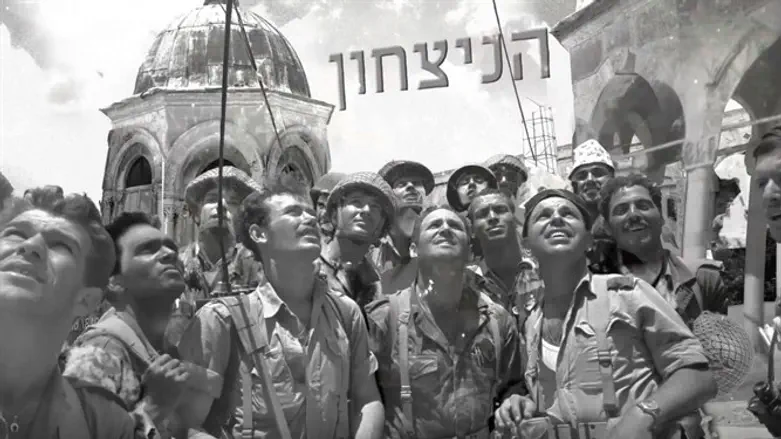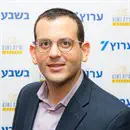
IDF commanders planning educational activities to mark 50 years since the liberation of Judea and Samaria during the Six Day War must abide by the IDF Education and Youth Department's new guidelines.
These guidelines, as told to Arutz Sheva, allow commanders to hold whatever activities they like, as long as they do not touch on forbidden topics.
In a document titled, "Emphasizing the explanations" under a section called "Jerusalem's reunification," it says, "The biggest accomplishment of the war was the reunification of Jerusalem as Israel's capital, 19 years after the War of Independence. Jerusalem is the beating heart of the Jewish nation, and it is a city holy to three nations, a city which combines past, present, and future."
"However, we call on the commanders to carefully choose their words, and not, G-d forbid, to say that Jerusalem was liberated during the Six Day War"
Liberated, however, is the word Prime Minister Netanyahu used at the Jerusalem Day celebration in Merkaz Harav Yeshiva.
"There are two different ways of discussing the IDF's actions and achievements during the Six Day War. One way is to say Jerusalem was liberated, and the other is to speak about the Jerusalem's reunification.
"For educational activities in the IDF, we will only use the phrase 'Jerusalem's reunification.'"
The IDF's Education Department bases its rules on a basic law stating Jerusalem is the capital of Israel. This law uses the phrase "the complete and unified Jerusalem" but does not use the word "liberated." The Department also said that for the first 19 years after Israel's War of Independence, Jerusalem was considered "divided" and therefore the state achieved in the Six Day War is "united."
An additional reason for their choice of words is that the Israeli government, when speaking about Israel's 69th Independence Day, said the year 2017 is a "jubilee year" marking "fifty years of a united Jerusalem."
 Rabbi Goren when the Temple Mount was liberated/ Credit: Eli Landau, La'am
Rabbi Goren when the Temple Mount was liberated/ Credit: Eli Landau, La'am
Land for peace
In the section titled "Characteristics of the Six Day War, it speaks about the war's diplomatic side and notes that "for the first time, Israel received properties which the world's nations decided could be swapped for peace."
The Education Department staff did not explain if in their opinion the Temple Mount, the Western Wall, or the rest of Israel are "properties" which can be "swapped for peace," a statement which is certainly a political opinion.
Judea and Samaria
In the document titled "Emphasizing the explanations," IDF commanders are explicitly forbidden to speak about Israel's and the Jewish nation's historical right to the biblical Land of Israel.
"When between various world views meet, the result can be complex. We must emphasize the fact that recognition of Judea and Samaria's history does not represent a political stance," the document stated.
"Therefore, we must emphasize the separation between rights and memories. In addition, we must not discuss Judea and Samaria's status, or our rights to it."
The fact is that the original recognition of the right of the Jewish people to a homeland of their own included Judea and Samaria until Jordan conquered the area in 1949.
 IDF Chief of Staff Gadi Eizenkot/ Credit: IDF spokesman
IDF Chief of Staff Gadi Eizenkot/ Credit: IDF spokesman
Did we win the war? That's a philosophical question.
In the document given to IDF commanders and educational staff, under the heading "The Ethics of Explanations," it discusses how commanders should relate to Israel's victory - the same victory IDF Chief of Staff Gadi Eizenkot discusses in every speech he gives on the topic, but which is somehow missing from discussions of the Six Day War.
"There is no doubt that the nature of the restricted conflicts today is different than the nature of previous wars," the document said. "The different nature of the war influences the nature of the victory.
"The question of what a military victory is, is a philosophical question which influences the decision makers - both in the IDF and in politics. However, this question is not relevant to us." The document then goes on to forbid IDF commanders from comparing the Six Day War's victory to the IDF's current reality.
IDF Spokesman's response:
"The educational plan discussing 50 years since the Six Day War places an emphasis on the IDF's values, its heroic stories, and the soldiers who fought in the war," an IDF spokesman said. "The IDF's victory in the Six Day War is at the heart of every educational activity on the topic, and we emphasize the retention of these values among today's soldiers."
"Any attempt to falsify or change the politics in these discussions is not something which we believe to be in line with our educational goals or the plan itself.
"The explanatory materials emphasize the importance of Jerusalem and encourage a sense of responsibility towards it and the rest of Israel. These materials deal with the relationship between Israel and Judea and Samaria, and focus on the IDF's victory.... We avoid touching on political topics.
"The Six Day War was a milestone in the IDF's history. IDF commanders will continue to preserve its memory and to strengthen the fighting spirit of the IDF's soldiers."
Other IDF sources said, "The quote is not from a current document. The current document speaks about the 'level of the fighter then and now, within the framework of the IDF's goals. Fulfilling missions is an expected achievement from any soldier and from the IDF as a whole.'"
